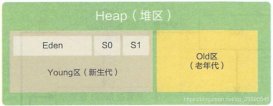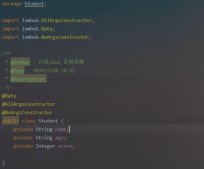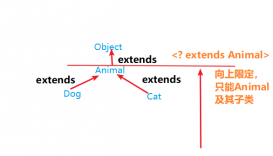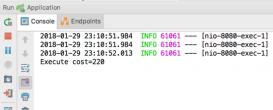给实体对象属性的空值赋默认值
|
1
2
3
4
5
6
7
8
9
10
11
12
13
14
15
16
17
18
19
20
21
22
23
24
25
26
27
28
29
30
31
32
33
34
35
36
37
38
39
40
41
42
43
44
45
46
47
48
49
50
51
52
53
54
55
56
57
58
59
60
61
62
63
64
65
66
67
68
69
70
71
72
73
74
75
76
77
78
|
private final String defaultStr = "";private final Date defaultDate = new Date();private final BigDecimal defaultDecimal = new BigDecimal(0);private final Timestamp defaultTimestamp=new Timestamp(new Date().getTime());//赋默认值public void setDefaultValue(Object object) { try { Class clazz = object.getClass(); Field[] fields = clazz.getDeclaredFields(); String primaryKey = EntityUtil.getPrimaryKey(currentSession(), object.getClass()); for(int i=0;i<fields.length;i++){ Field field = fields[i]; String fieldName = field.getName(); Class fieldClass=field.getType(); field.setAccessible(true); //设置访问权限 if(!fieldName.equals(primaryKey) && isFieldValueNull(fieldName,object)){ if (fieldClass == Integer.class ) { field.set(object, defaultDecimal.intValue()); }else if (fieldClass == Long.class) { field.set(object, defaultDecimal.longValue()); }else if (fieldClass == Float.class) { field.set(object, defaultDecimal.doubleValue()); }else if (fieldClass == BigDecimal.class) { field.set(object, defaultDecimal); } else if (fieldClass == Date.class) { field.set(object, defaultDate); } else if (fieldClass == String.class){ field.set(object, defaultStr); // 设置值 } else if (fieldClass == Timestamp.class){ field.set(object, defaultTimestamp); } }else if(fieldName.equals(primaryKey) && isStringFieldValueNull(fieldName,object,fieldClass)){//MySQL,需要对对主键做特殊处理 field.set(object, null); } } } catch (Exception e) { e.printStackTrace(); System.out.println(e.getMessage()); } } //判断字段是否为空 private boolean isFieldValueNull(String fieldName, Object object) throws ClassNotFoundException { boolean isNUll=false; try { String firstLetter = fieldName.substring(0, 1).toUpperCase(); String getter = "get" + firstLetter + fieldName.substring(1); Method method = object.getClass().getMethod(getter, new Class[] {}); Object value = method.invoke(object, new Object[] {}); if(value==null){ isNUll=true; } return isNUll; } catch (Exception e) { return isNUll; } } //判断主键是否为空值 private boolean isStringFieldValueNull(String fieldName, Object object, Class fieldClass) throws ClassNotFoundException { boolean isNUll=false; try { String firstLetter = fieldName.substring(0, 1).toUpperCase(); String getter = "get" + firstLetter + fieldName.substring(1); Method method = object.getClass().getMethod(getter, new Class[] {}); Object value = method.invoke(object, new Object[] {}); if(value==null ){ isNUll=true; }else{ if (fieldClass == String.class && StringUtils.isBlank((String)value)) { isNUll=true; } } return isNUll; } catch (Exception e) { return isNUll; } } |
给实体类赋默认值通用方法
|
1
2
3
4
5
6
7
8
9
10
11
12
13
14
15
16
17
18
19
20
21
22
23
24
25
26
27
28
29
30
31
32
33
34
35
36
37
38
39
40
41
42
43
44
45
46
47
48
49
50
51
52
53
54
55
56
57
58
59
60
|
package com.clamc.common.util;import java.lang.reflect.Field;import java.lang.reflect.Modifier;import java.math.BigDecimal;import java.sql.Date;import java.sql.Timestamp;import java.util.ArrayList;import java.util.List;/** * yangzhiwei * 使用反射给实体类k赋值(默认值) * insert update会报null异常,为空时不能插入和更新 */public class ObjInvoke { public static Object getObjDefault(Object obj) { // 得到类对象 Class objCla = obj.getClass(); Field[] fs = objCla.getDeclaredFields(); for (int i = 0; i < fs.length; i++) { Field f = fs[i]; // 设置些属性是可以访问的 boolean isStatic = Modifier.isStatic(f.getModifiers()); if(isStatic){ continue; } // 设置些属性是可以访问的 f.setAccessible(true); try { // 得到此属性的值 Object val = f.get(obj); // 得到此属性的类型 String type = f.getType().toString(); if (type.endsWith("String") && val == null) { // 给属性设值 f.set(obj, ""); } else if ((type.endsWith("int") || type.endsWith("Integer") || type.endsWith("double")) && val == null) { f.set(obj, 0); }else if ((type.endsWith("long")|| type.endsWith("Long") )&& val == null){ f.set(obj, 0L); } else if (type.endsWith("Date") && val == null) { f.set(obj, Date.valueOf("1970-01-01")); }else if(type.endsWith("Timestamp") && val == null){ f.set(obj, Timestamp.valueOf("1970-01-01 00:00:00")); } else if (type.endsWith("BigDecimal") && val == null) { f.set(obj, new BigDecimal(0)); } } catch (Exception e) { e.printStackTrace(); } } return obj; } public static List getObjDefaultList(List objList) { List list=new ArrayList(); for(Object t:objList){ list.add(getObjDefault(t)); } return list; }} |
以上为个人经验,希望能给大家一个参考,也希望大家多多支持服务器之家。
原文链接:https://blog.csdn.net/qq_33734094/article/details/80450586

















